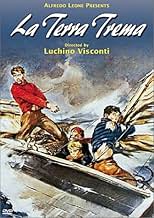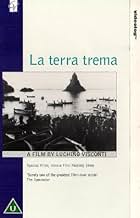IMDb RATING
7.8/10
5.8K
YOUR RATING
In rural Sicily, the fishermen live at the mercy of the greedy wholesalers. One family risks everything to buy their own boat and operate independently.In rural Sicily, the fishermen live at the mercy of the greedy wholesalers. One family risks everything to buy their own boat and operate independently.In rural Sicily, the fishermen live at the mercy of the greedy wholesalers. One family risks everything to buy their own boat and operate independently.
- Awards
- 1 win & 1 nomination total
Luchino Visconti
- Narrator
- (voice)
- (uncredited)
Antonio Pietrangeli
- Narrator
- (voice)
- (uncredited)
Antonio Arcidiacono
- Ntoni
- (uncredited)
Giuseppe Arcidiacono
- Cola
- (uncredited)
Venera Bonaccorso
- La vecchia che ride
- (uncredited)
Nicola Castorino
- Nicola
- (uncredited)
Rosa Catalano
- Rosa
- (uncredited)
Rosa Costanzo
- Nedda
- (uncredited)
Alfio Fichera
- Michele
- (uncredited)
Carmela Fichera
- La baronessa
- (uncredited)
Agnese Giammona
- Lucia
- (uncredited)
Nelluccia Giammona
- Mara
- (uncredited)
Ignazio Maccarone
- Maccarone
- (uncredited)
Giovanni Maiorana
- Un bambino
- (uncredited)
Antonino Micale
- Vanni
- (uncredited)
Maria Micale
- La madre
- (uncredited)
- Director
- Writers
- All cast & crew
- Production, box office & more at IMDbPro
Storyline
Did you know
- TriviaWhen financing fell through, Visconti was forced to sell some of his mother's jewelry and one of the family's apartments in Rome to finish the film.
- Quotes
Title Card: [in Italian] In Sicily, Italian is not the language of the poor.
- Alternate versionsWas originally released without Italian narration, but it flopped because the Italian audience could not understand the Sicilian dialect. Visconti re-released it with his own narration, which many find detracts from the film.
- ConnectionsEdited into Bellissimo: Immagini del cinema italiano (1985)
Featured review
Luchino Visconti's epic on a family living in the Sicilian fishing village of Trezza, the Valastros, is a compelling story, told with sincerity and skill, and for the outsider viewing into their world it's at the least interesting and at its most heart-felt is rather affecting. Narrators Visconti and Antonio Pietrangeli themselves are outsiders to the world of dirt-poor fishermen who work their entire lives to earn pittance for the wealthy wholesalers (it's based on a novel, I Malavoglia- translated as Ill Will- by Giovanni Verga).
Their narration can hint the audience member on little details that wouldn't be known from the characters, however sometimes their voice-over, in such a documentary style (before this Visconti was among a group of directors for a documentary during world war 2 that is not listed on this site but it mentioned in the documentary My Voyage to Italy) can be a little deterring as they mention certain emotions the characters are feeling that we as the audience can determine right in the eyes.
The story tells of the Valastros, in particular 'Ntoni, an idealist who returns from fighting in the war with a much different view of the environment around him than what his elders would want to believe. Unlike his grandfather, who has worked for the wholesalers and not earned and saved a cent more or less than his children, he wants change in the way things are done, and soon gets enough money to build his own boat and to sell his own fish.
Things look optimistic, until nature intervenes in destroying the boat, leaving 'Ntoni without a job, the wholesalers laughing at him mercilessly and little by little loosing any respect he had in the village. His other family members also get time on the screen- two sisters who want to meet a man to marry, and how one is at the will of God and the other is at the will of the Don of the village, Don Salvatore; also a brother, who after losing his job becomes a smuggler bringing in cigarettes. Their stories, in a pacing that may have some wondering when it will end and some wondering if it can go on longer, lead up to a heartbreaking climax for each of them.
I learned shortly after viewing La Terra Trema that Luchino Visconti (I suppose it shouldn't have been much of a surprise considering the state Italy was in before, during, and after the war) was a lifelong member of the Communist party despite being raised in a wealthy environment in Northern Italy. While I had a feeling there was something about the way Visconti depicted the Volostros and the nature of the people and the village that seemed "for the working man", but I didn't really feel that the political intonations were a crutch to the overall execution of the film. Since one of the pin-points of neo-realism is to tell things as simply as they unfold in real life, no matter how downtrodden it can get, the focus of the fishermen versus the wholesalers is made more as a reflection of basic good versus evil, and it can appeal to those who don't want a strict tale of classes.
Its humanity is what shines through, and that is what should appeal to connoisseurs of neo-realism and Italian filmmaking; while I can't quite recommend it as much as The Bicycle Thief or Open City, I can recommend it as the first film people should see if they want to know and understand the work of Visconti, his operatic intonations with his players a graceful counterpart to his documentary techniques.
Their narration can hint the audience member on little details that wouldn't be known from the characters, however sometimes their voice-over, in such a documentary style (before this Visconti was among a group of directors for a documentary during world war 2 that is not listed on this site but it mentioned in the documentary My Voyage to Italy) can be a little deterring as they mention certain emotions the characters are feeling that we as the audience can determine right in the eyes.
The story tells of the Valastros, in particular 'Ntoni, an idealist who returns from fighting in the war with a much different view of the environment around him than what his elders would want to believe. Unlike his grandfather, who has worked for the wholesalers and not earned and saved a cent more or less than his children, he wants change in the way things are done, and soon gets enough money to build his own boat and to sell his own fish.
Things look optimistic, until nature intervenes in destroying the boat, leaving 'Ntoni without a job, the wholesalers laughing at him mercilessly and little by little loosing any respect he had in the village. His other family members also get time on the screen- two sisters who want to meet a man to marry, and how one is at the will of God and the other is at the will of the Don of the village, Don Salvatore; also a brother, who after losing his job becomes a smuggler bringing in cigarettes. Their stories, in a pacing that may have some wondering when it will end and some wondering if it can go on longer, lead up to a heartbreaking climax for each of them.
I learned shortly after viewing La Terra Trema that Luchino Visconti (I suppose it shouldn't have been much of a surprise considering the state Italy was in before, during, and after the war) was a lifelong member of the Communist party despite being raised in a wealthy environment in Northern Italy. While I had a feeling there was something about the way Visconti depicted the Volostros and the nature of the people and the village that seemed "for the working man", but I didn't really feel that the political intonations were a crutch to the overall execution of the film. Since one of the pin-points of neo-realism is to tell things as simply as they unfold in real life, no matter how downtrodden it can get, the focus of the fishermen versus the wholesalers is made more as a reflection of basic good versus evil, and it can appeal to those who don't want a strict tale of classes.
Its humanity is what shines through, and that is what should appeal to connoisseurs of neo-realism and Italian filmmaking; while I can't quite recommend it as much as The Bicycle Thief or Open City, I can recommend it as the first film people should see if they want to know and understand the work of Visconti, his operatic intonations with his players a graceful counterpart to his documentary techniques.
- Quinoa1984
- Aug 17, 2003
- Permalink
- How long is La Terra Trema?Powered by Alexa
Details
- Runtime2 hours 40 minutes
- Color
- Aspect ratio
- 1.37 : 1
Contribute to this page
Suggest an edit or add missing content























